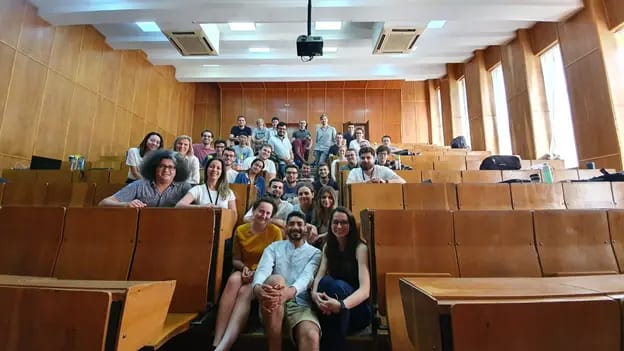Graduate course at UiB, 2022: MAT330
University Course for BSc, MSc and PhD students Department of Mathematics – University of Bergen
Course synopsis (Emne)
We will consider problems in geosciences, for which data is available but the rules may be incompletely known, uncertain or even completely unknown. This gives rise to three different tools to extract information from data: Geostatistics, data assimilation and machine learning.
Data Assimilation designates all the techniques that can incorporate measurements into a numerical model to improve its predictions. Data assimilation has been the key behind the skillful weather predictions and is also used in operational oceanography, climate predictions, reservoir history matching and COVID-19 epidemiology among other applications.
The course will go through the theoretical background underpinning modern data assimilation techniques. The focus will be on probabilistic methods such as the Kalman Filter (KF) and its extensions for non-linear systems, notably its ensemble variant (EnKF).
The necessary notions of spatiotemporal statistics will be introduced. The course will also complement the students with an introduction to spatial statistics (Geostatistics) and Machine Learning and draw the parallels between these methods.
Info
Teacher team
- Geir Evensen, GE (NORCE/NERSC)
- Laurent Bertino, LB (NERSC)
- Julien Brajard, JB (NERSC/Sorbonne University, Fr)
- Patrick N. Raanes, PR (NORCE)
Course duration: 48 hours, in English.
Period covered: August 23 - October 25, 2022
Program
- LB: Overview. Geostatistics (Variogram, Kriging, non-linear geostatistics). Examples of data assimilation in oceanography. (12 hours).
- GE: Theory of variational and sequential Gaussian data assimilation, ensemble-based methods, from a Bayesian perspective. (12 hours).
- PR: Practical tutorials on data assimilation in Python and Jupyter. (12 hours).
- JB: Introduction to Machine Learning (basic principles of machine learning, example of machine learning algorithms). (8 hours + 4 hours practical exercises).
Dates
| 23/08 | 25/08 | 01/09 | 06/09 | 13/09 | 15/09 | 20/09 | 22/09 | 27/09 | 04/10 | 18/10 | 25/10 |
| LB | LB | LB | GE | GE | PR | GE | PR | PR | JB | JB | JB |
All classes take place from 10:15 to 14:00 with a lunch break at 12:00 (not supplied)
Location: NERSC – Jahnebakken 3, 5007, Bergen. “Copernicus” Seminar Room (First floor, to the left).
A remote access will be available on Teams. The links and passwords will be made available on the MittUiB website.
Videos can be consulted here
Prerequisites
Some knowledge of the following subjects is assumed:
- Linear algebra
- Probabilities
- Statistics.
- Programming (Python)
Suggested bibliography (Pensum)
- G. Evensen, F. Vossepoel, P.J. van Leeuwen. Data Assimilation Fundamentals (2022) Sections TBD.
- H. Wackernagel. Linear Geostatistics. Lecture notes. Sections 1 to 12 and Section 15.
- J. Vanderplas: Python Data Science Handbook (Section 5)
- F. Chollet: Deep Learning with Python, Second Edition
The Wackernalgel PDFs will be uploaded on the MittUiB website, the others are publicly available on the web.
Exams
Oral and voluntary exercises (frivillig innlevering)


